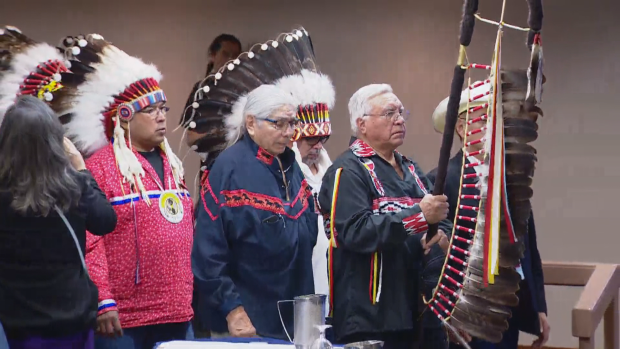Alberta takes historic step to abolish red tape in health care for First Nations children
Alberta became the first province Thursday to commit to fully implementing Jordan's Principle, an agreement intended to end funding squabbles over who pays the health care bills for First Nations' children.
In what is being hailed as a first, the federal and Alberta governments and the chiefs of 11 First Nations from Treaties 6, 7 and 8 signed a memorandum of understanding on Thursday at a ceremony in Edmonton.
Under the agreement, First Nations children will receive culturally appropriate health care without any delays in deciding which level of government will pay, said Jane Philpott, federal minister of indigenous services.
"Let's give a big shout-out to Alberta for stepping up to the plate," Philpott said. "I hope it will be a model for other parts of Canada."
Jordan's Principle, aimed at overcoming red tape that delays or prevents Indigenous children from getting equal access to services available to other Canadian children, was created in honour of Jordan River Anderson, a Manitoba boy from Norway House Cree Nation.
Anderson was born with multiple disabilities that required him to remain in hospital after his birth. When he was two, doctors said he could move into a special home but the provincial and federal governments could not agree on who would pay for his home-based care. As a result, the boy remained in hospital, where he died in 2005 at age five.
"It is too bad that Jordan River Anderson had to die," Bigstone Cree Nation Chief Clara Moberly said.
"But because of his sacrifice, finally, we see the fiduciary responsibility of government starting to be met. Finally, we can see positive steps to eliminate the inequality ... that our people have suffered."
Moberly noted that many First Nations people feel strongly that treaty relationships are with the federal — not provincial — government. But Thursday's signing ceremony, she said, is about creating a new collaborative effort "to achieve more and be more effective for the children.
"We can't keep arguing amongst each other," she said. "We have to do this for our children because it's getting pretty hard out there."

Danielle Larivee, Alberta minister of children's services, said she first became aware of Jordan's Principle 10 years ago when she was working as a nurse.
"Today is an important day for First Nations children and families, and for Alberta as a whole," she said. "Every child deserves the same chance at a happy and healthy life, no matter where they are born or where they live."
The ceremony in Edmonton was treated as a celebration, including a grand entry, drummers, singers and youth dancers. The memorandum of understanding was signed by Larivee, Philpott and officials representing the First Nations Health Consortium, an organization created in 2017 to implement Jordan's Principle.
Under the agreement, the department that is first contacted will pays for the service and can later seek reimbursement.
Between July 2016 and Sept. 30, 2018, a total of 165,000 health requests were approved across Canada for First Nations children under Jordan's Principle. Of those, 8,129 were approved in Alberta.
Requests include mental health supports, medical equipment, speech therapy, education supports and more.
In June, Larivee announced plans to create a new system to deal with child interventions in Alberta. The full implementation of Jordan's Principle was identified as one of the first actions to be undertaken.
Philpott thanked Alberta for stepping forward to enshrine the principle in Alberta's health care processes.
"This first-of-its-kind trilateral agreement sits at the heart of what Jordan's Principle is meant to achieve," she said in the news release. "This ensures that all orders of government and First Nation partners are working together to support First Nations children and families."

